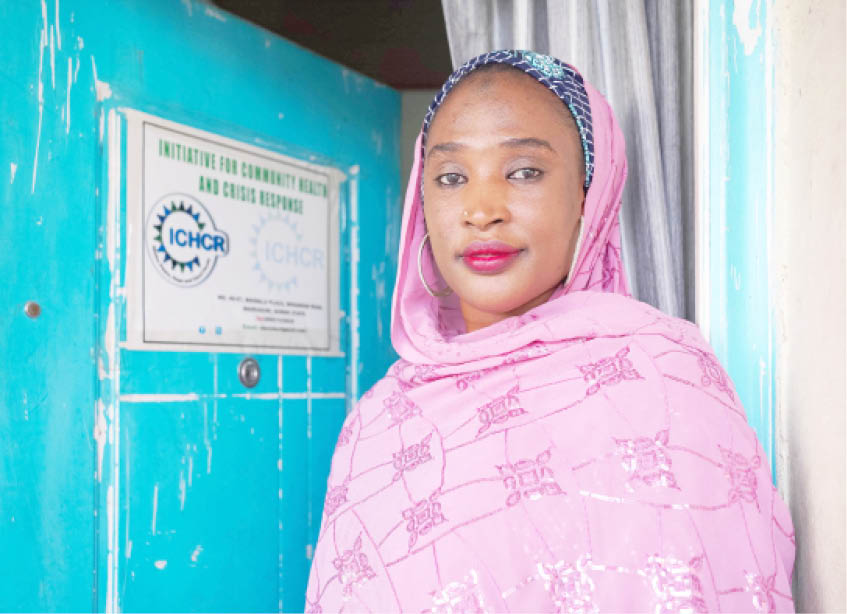A woman in Borno political landscape
Hauwa Magaji sat confidently and comfortably in her office in Maiduguri

Hauwa Magaji sat confidently and comfortably in her office in Maiduguri in a colourful attire
Hauwa Magaji sat confidently and comfortably in her office in Maiduguri in a colourful attire. She, like many women in the modern world, navigates various roles. She is a single mother of two, runs an aid organisation and is a Special Adviser (SA) to the Governor of Borno State.
In Western societies where women juggle many roles, it may be admirable. However, in Borno, a conservative community where women’s roles are defined and there are expectations to what template of life a woman should follow, Hauwa, like her peers, faces daily challenges.
Before these trajectories, life for Hauwa started in a quiet way. She was born and raised in Maiduguri in a middle-class family. Tragically, 10 years ago, Boko Haram, a terrorist group, devastated many communities; changing the lives of millions across the state. As the state reeled from the shock of deaths and destruction and struggled to continue with life, Hauwa, armed with a degree in Languages and Linguistics, was spurred into action. Disturbed by the aftermath of the conflict and wanting to help, she developed a project called: ‘’Project Give Back”, a community development initiative focused on volunteer teaching, peace building and environmental sanitation.
She said, ‘’I have seen how the insurgency has traumatised people. The Boko Haram insurgency has affected many, especially women and children, and we have many unaccompanied children. They are the most vulnerable, and I felt that I had to do something to help at my level. I didn’t have funding or an organisation at the time, and so I became a volunteer teacher. I go to the camps for Internally Displaced Persons (IDP) to teach young people; including psychosocial counselling of children.”
As she worked tirelessly as a volunteer teacher while juggling the dual role of a mother and a wife, some organisations became interested in collaborating with her and partnerships started. Sensing the need to make it official for proper documentation and coordination, Hauwa registered her organisation, Initiative for Community Health and Crises Response. As the executive director of the organisation, she began to draw attention to many societal issues. This bold move drew the attention of the then Governor Kashim Shettima who saw a photo online and she was appointed a Special Assistant (SA) on Special Projects. She and many young people were selected.
On this she said, “I knew this was the first step; to be a voice for the vulnerable women and youths and to make sure all the projects that youths benefit from is being done in the right way; a chance to have influence.”
As someone new to the political scene, Hauwa was surprised by not only the appointment, but was amazed at how overwhelming the new role was. However, this, in reality, she felt was a rare opportunity for her to study and serve in the political terrain.
She explained that, “My interest in the political landscape of Borno started when I joined the team working for the former governor. In my team, we used to discuss how we were going to join politics because we knew that young people were not part of decision making. We used to joke about running for office, but I became serious and decided to run. I knew that by doing that I would pave my way to the top and make impact, especially for women who were not being acknowledged. I wanted to make sure women were heard.”
Daring to join the political scene dominated by male candidates and godfathers, Hauwa was unprepared for the daunting task of running for office in a conservative Northern Nigerian town. Firstly, she rediscovered that it was a male-dominated world and a patriarchal society that viewed women politicians as unwanted, and noted that although women were educated, respected and often given minor positions, there were many cultural, religious and political barriers hindering their growth.
She said, “There are a lot of obstacles. There is poverty. If you don’t have money, you can’t run. Men have really dominated the positions. There is “bring down syndrome”; women not supporting women. Lack of mentorship also exists. There is no enabling environment for youths, no one is mentoring you. Even in my case, I blindly joined politics without knowing where to start.”
Historically, Borno has had inspirational women leaders in the political landscape. Many women were revered but remain “unappointed”. For instance, in 2019, over 20 women vied for positions. Sadly, only few were elected or selected. In like manner, Hauwa lost the seat to represent Maiduguri Metropolis in the House of Assembly in 2019 to a man. The obstacles her predecessors faced reared its ugly head again.
Hauwa said, “Just like every woman running for office in Borno, my challenges were financial. And being a woman, we are definitely sidelined. We were not viewed as capable. Even when you have shown your potentials, the men always come together to marginalise the women. And then our society is not being enlightened on choosing the right person to represent it; whether a man or a woman.
“Therefore, there is a need for advocacy at the grassroots to make sure our people vote for the right candidates regardless of their financial status. The men come together to support their candidates because when their candidates win, they get what they want.’’
Despite many efforts to address political marginalisation of women across Nigeria, there is minimal improvement as presently, “Only one female represents Borno at the federal level. There are 11 special advisers, 12 special assistants and six women as heads of agencies, with just two commissioners. There are no women in the Borno State House of Assembly. Women are still fighting for representation at all levels,” Hauwa lamented.
